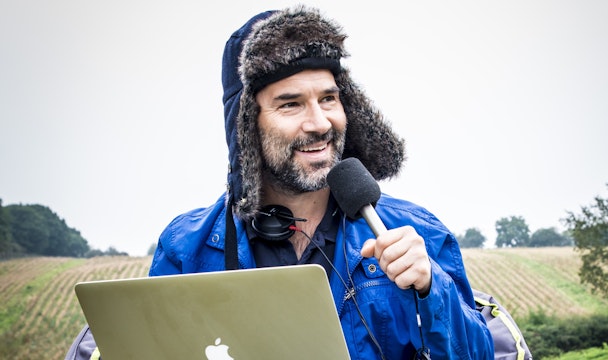Is lovingly crafted, homemade advertising Adam Buxton’s podcasting secret?
For The Drum’s Entertainment Focus, we sit down with the comedian, TV star and podcast primo to find out about the magic dust he puts into podcasting’s only unskippable ads.

Adam Buxton: TV host, comedian, podcaster, and adman? / Adam Buxton / Photo: Matt Crockett
As an editor for a publication about marketing, my ad exposure is high and my tolerance is low. I see and hear a lot of ads and I know their tricks, so when I’m off the clock, I’m an inveterate ad skipper and avoider – with just one exception, the Adam Buxton Podcast.
Not only do I not skip those ads, I enjoy them. I replay them. I am entertained by them. So I sat down with Buxton himself to puzzle out what the secret is to actually engaging podcast ads. And, given that they feature an often quite weird array of in-jokes, characters and niche cultural references, how does he get away with them?
Advertisement
The mixtape approach to podcasting
Buxton’s break was on TV, with comedy partner (now film director) Joe Cornish on Channel 4’s The Adam and Joe Show in the late 90s, before moving into radio at Xfm (now Radio X) and BBC Radio 6 Music. The radio work spawned podcasts that were precursors to Buxton’s current show, but the TV show contained a blueprint for the podcast, too, with a DIY aesthetic that bore the fingerprints of its hosts on every aspect of its production.
From day one, Buxton tells The Drum, he was fascinated by every aspect of a piece of media, including the ads it contained. “I used to be fascinated by advertising; I used to think that maybe I would go into advertising. Joe Cornish and I have always liked ads and we conceived our media empire as, I suppose, a production company that would make not only films but ads as well. We were inspired by people like Ridley Scott – people in that crossover of advertising and music videos, where things were visually stylish and had lots of fun ideas in them.”
He goes on: “Advertising is really important. It’s part of people’s cultural environment; it’s something that they are surrounded by almost all the time, especially if they live in cities. So to make shitty adverts is such an affront to those people. It’s like environmental pollution on a catastrophic scale because it gets in people’s heads and they’re exposed to it so often. And, you know, what you want to do is make stuff that brightens people’s lives and cheers them up and makes them laugh or shows them something they haven’t seen before.”
Advertisement
In his podcast, that manifests as equal care and attention from Buxton himself on every aspect, from start to finish: music, jingles, ads and centerpiece interviews with people of note, from Tom Hanks to MSF doctors and old friends like Louis Theroux. “It’s about wanting to make the whole thing a cohesive experience, a bespoke, lovingly made thing, just as we wanted The Adam and Joe Show to be a bit like a mixtape that you would make for a friend. I used to spend a fuck of a lot of time making tapes and then CDs. It’s just a fun way of being creative by using stuff that’s already there.”
Whether to include ads on the podcast (and what format they would take) was an important early question for Buxton when he was setting up his current show back in 2015. At the time, the crowdfunding model was at its peak and Buxton says he felt some pressure to ditch ads entirely. “Some of the podcasts I listened to were very militant about it; they’d say that having ads on your podcast makes the world worse, that it betrays what’s best about the medium, that you should be asking your listeners for their support. But I disagreed. It was quite annoying to hear podcast hosts pause the program and harangue the listeners for their support, then go through a long, tedious list of all the things that you would get if you joined the Patreon. I mean, it’s a good way to go but it’s not the way I wanted to go.”
‘You can get away with quite a lot’
Playing around with ads has thus been part of the podcast’s identity since day one. Its first episode features a non-sponsored parody of Squarespace ads (as ‘Sparesquace’). Soon after, Buxton joined the Acast network, which has since acted as the intermediary between Buxton and his advertisers.
Speaking of intermediaries, there are no agencies or other creatives involved – just Buxton himself, who takes a three-bullet-point brief through Acast’s Ad Collab platform after a brand has declared it would like to work with him. He creates his original song or scene and submits it for approval himself.
Suggested newsletters for you
With so many advertisers so concerned about ‘brand safety,’ you might expect that Buxton’s unique approach (which features in-jokes about his TV show in the 90s, burps, characters with unmentioned backstories, swearing, parodies of other podcasts, farts, songs, a good amount of toilet humor, arguments and heavy metal library music) would lead to a nightmare of corrections and revisions. But Buxton describes a relatively pain-free – not to mention creative – process. “People like Bill Burr will do sponsor reads and be openly rude about the products. I wasn’t going to do that, but I saw there was a lot of latitude – way more than if you were doing an ad for radio or TV. In podcasting, you get away with quite a lot.”
Not every brand is keen on every ad, of course (Buxton has some horror stories), but most, he says, are aware of what they’re getting. No prizes for guessing the brand he ranks as the easiest to work with: perhaps the most ubiquitous podcasting advertiser, Squarespace. “I suppose it has decided that it is happy with the level of engagement that it gets from the ads I do. So, my brief is as broad as it could possibly be. As long as I direct people to the website and give them the offer code, that’s about it. It is happy with whatever else I construct around that.”
‘Podcasting is about as much fun as I’ve ever had’
Podcasting has been going through a change in the last few years – you could call it a ‘professionalization,’ but that’s not quite right. It’s more of a slickification: more shiny, commercial and visual, with high-production multi-camera set-ups, not to mention rapid ecosystems to regurgitate content on every platform. These approaches are profoundly un-Buxtonian, who says that he’s amazed how quickly it has turned into TV. “For me, what’s fun about podcasting is that it isn’t TV. It’s an audio medium. And there’s a particular kind of connection that you make when you’re just listening to something rather than watching it.”
Still, Buxton is sanguine about his relationship to this shifting medium. “It’s just the only thing I can do. I don’t have that level of professionalism. I’m not slick enough to be more in the mainstream… The whole thing about the podcast is that it is the best opportunity I have to get things as good as I can make them, to play to my strengths. The vast majority of the time on the podcast is editing: making the guests sound as good as possible, making the conversation flow as well as I can, cutting out the bits where I sound like a stupid prick. These are all things you wouldn’t really be able to do so easily if you were doing them in a more high-end way… All I can do really is carry on doing it the way I like doing it.
“And as far as the industry as a whole goes, I think that’s always going to be the case. You start out with people fooling around and having fun and then suddenly everyone wakes up to the fact that, ‘Oh, these things can make quite a lot of money’. And then it’s a question of, ‘How do we churn this out? How do we get as many episodes of this thing out as possible?’ Well, you put more money in, you have bigger teams of people. You film it so that it can connect with audiences on other platforms. Gradually, it goes the way of everything, which is just to exclude the non-professionals, really, and service the ambitions of the people with the most money. I’m not saying that as some kind of anti-capitalist complaint; it’s just a fact of life and business and making things. But there are lots of those podcasts that I really like. You definitely can have a big, slick, nicely made podcast that is still fun to listen to.”
So don’t expect Buxton to be displaced by the behemoths. “Podcasting is about as much fun as I’ve ever had. It’s about as secure and happy as I’ve ever felt making things. I can’t imagine doing anything else other than podcasting, but that might change.”
Adam’s ad school
We played some of Buxton’s greatest ad hits back to him. Here are his thoughts on what makes for great homemade advertising.
-
Use stock, but use good stock: “Sometimes, half the battle is finding a good bit of library music. I feel as though I’ve used a lot of the library music that exists in the world for adverts.”
-
Embrace weirdness: “I think for a lot of people, it’s probably quite mystifying, but I don’t think it matters. It just adds to a layer; it piques the interest. Anything that is ‘sticky’ is generally a good thing. Unless it’s very irritating, unless it makes people switch off – and I imagine I’ve done a few of those as well. But on the whole, I think weirdness is good.”
-
Make the most of your limitations: “[Advertising is] such a fun medium. You can do so much; you can try things out. The constraints of advertising are actually very good for creativity. You have to work within a brief; you’ve got so many things that you have to operate within – time and budget and language and everything like that. That’s quite good for doing something interesting.”
-
Use ads as a metric of your podcasting success: “Because I’ve made it a policy not to look at stats or track analytics of any kind, the only indication I have as to whether anyone’s still listening is the ads. If I still keep getting people wanting to run ads on the podcast, that seems to be an indication that it’s still doing OK.”
Love games, movies, TV, music and podcasts? Us too. Head over to The Drum’s dedicated Entertainment Focus hub.

